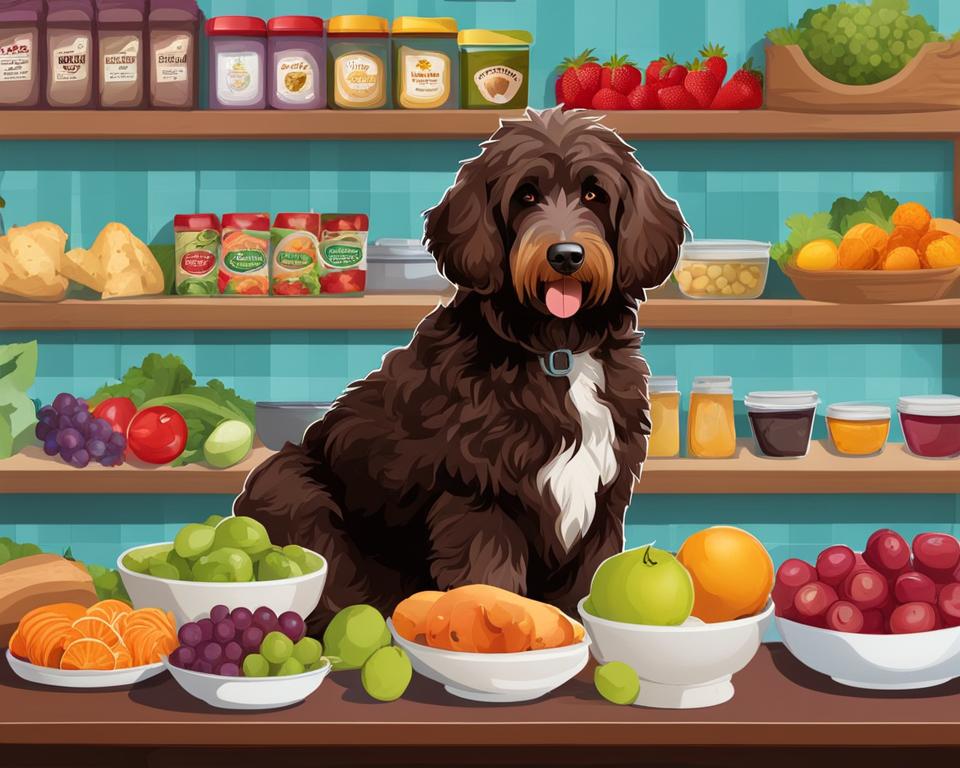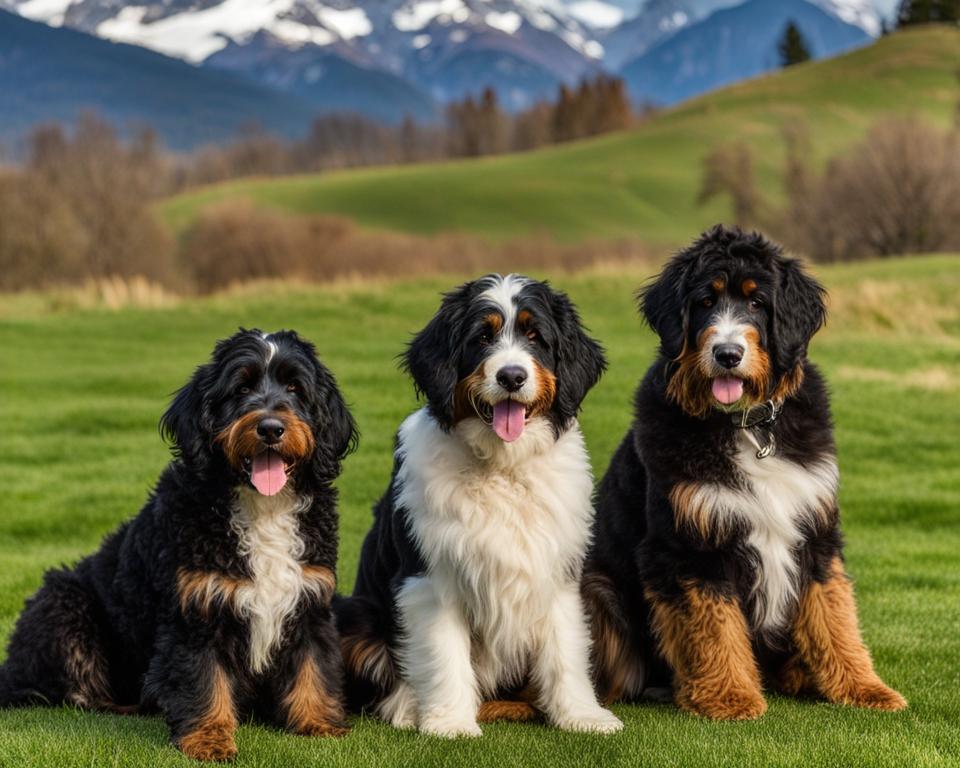When it comes to the health and well-being of your Bernedoodle, providing them with the right nutrition is crucial. Bernedoodles have specific dietary needs that should be met to ensure optimal health and prevent common health issues. In this guide, we will explore the optimal diet for Bernedoodles, their nutritional requirements, safe and nutritious foods to include in their diet, and foods to avoid or limit. Let’s dive in!
Key Takeaways:
- Choosing a raw food diet is best for Bernedoodles as it provides natural, whole foods and necessary nutrients.
- Bernedoodles have a digestive system that is best suited for high-protein-based diets and not designed to digest carbohydrates.
- A balanced diet for Bernedoodles includes high-quality protein, healthy fats, vitamins, minerals, and fiber from vegetables and berries.
- Bernedoodles have specific nutritional requirements based on their size, activity level, and any dietary sensitivities or allergies.
- It’s important to choose high-quality dog food labeled as “complete and balanced” with real meat as the first ingredient and without artificial additives or fillers.
Understanding Bernedoodle Nutritional Requirements
Bernedoodles have specific nutritional requirements based on their size and activity level. It is essential to provide them with a well-balanced diet that meets their individual needs to promote optimal health and weight management.
The primary component of a Bernedoodle’s diet should be high-quality protein. This contributes to muscle development and repair. Lean sources of protein such as chicken, turkey, beef, and fish are excellent options. Along with protein, carbohydrates from whole grains and vegetables are essential for providing energy for daily activities. Including healthy fats rich in omega-3 and omega-6 fatty acids promotes coat health and overall wellness.
Essential vitamins and minerals are crucial for supporting the immune system and maintaining overall health in Bernedoodles. Consulting a veterinarian to formulate a customized meal plan considering their size, activity level, and any dietary sensitivities or allergies is highly recommended. Monitoring portion sizes is also important to prevent obesity and maintain a healthy weight.
Sample Bernedoodle Meal Plan
| Meal | Food | Portion Size |
|---|---|---|
| Breakfast | Chicken (cooked) | 1 cup |
| Broccoli (steamed) | 1/2 cup | |
| Brown Rice | 1/4 cup | |
| Lunch | Turkey (cooked) | 1 cup |
| Carrots (raw) | 1/2 cup | |
| Quinoa | 1/4 cup | |
| Dinner | Fish (cooked) | 1 cup |
| Sweet Potato (baked) | 1/2 cup | |
| Spinach (raw) | 1/4 cup | |
| Snacks | Blueberries | 5-10 pieces |
| Peanut Butter (unsalted) | 1 tablespoon |
Remember, the provided meal plan is a sample and should be adjusted according to your Bernedoodle’s specific needs. Regularly consult with a veterinarian to ensure the nutritional requirements are being met, and make necessary adjustments based on their health and weight management goals.
Safe and Nutritious Foods for Bernedoodles
When it comes to choosing the best food for your Bernedoodle, it’s important to prioritize their health and nutritional needs. Selecting high-quality dog food that is labeled as “complete and balanced” is essential in ensuring they receive the necessary nutrients for optimal health. Look for products that have real meat listed as the first ingredient and avoid those that contain artificial additives or fillers.
Lean proteins are excellent sources of protein for Bernedoodles. Cooked chicken, turkey, beef, or fish can be included in their diet to support muscle development and overall wellness. Fresh fruits and vegetables, such as apple slices, blueberries, carrots, and green beans, provide essential vitamins and minerals. Whole grains like brown rice, oats, and quinoa are a good source of complex carbohydrates and fiber. Dairy products and cooked eggs can also be included in moderation.
| Safe and Nutritious Foods for Bernedoodles | |
|---|---|
| Lean proteins: | Cooked chicken, turkey, beef, or fish |
| Fruits and vegetables: | Apple slices, blueberries, carrots, green beans |
| Whole grains: | Brown rice, oats, quinoa |
| Dairy and eggs: | In moderation |
In addition to these food options, you can also consider incorporating fish oil supplements into your Bernedoodle’s diet. These supplements provide omega-3 fatty acids that promote coat health. Remember to always provide fresh and clean water for your Bernedoodle to stay hydrated.
Bernedoodle Dietary Recommendations: Foods to Avoid or Limit
When it comes to the dietary needs of Bernedoodles, there are certain foods that should be avoided or given in limited quantities. It’s essential to prioritize their health and well-being by steering clear of potentially harmful substances. Here are some foods to be cautious of:
Foods to Avoid:
- Chocolate and Caffeine: These substances can be toxic to dogs and lead to serious health issues, including heart problems and even death.
- Grapes and Raisins: These foods can cause kidney failure in dogs, so it’s crucial to keep them out of your Bernedoodle’s reach.
- Onions and Garlic: These ingredients, whether raw, cooked, or powdered, can damage a dog’s red blood cells and cause anemia.
- Avocado: Avocado contains persin, which is toxic to dogs and can lead to gastrointestinal issues.
- Xylitol: Xylitol, often found in sugar-free candies and gum, can cause a sudden release of insulin in dogs and lead to low blood sugar.
Foods to Limit:
- Alcohol: Alcohol consumption can be extremely dangerous for dogs, leading to impaired coordination, liver damage, and even coma.
- Cooked Bones: Cooked bones can splinter and cause choking hazards or damage to a dog’s digestive system. Avoid giving your Bernedoodle cooked bones.
- Processed Foods: Foods high in salt, sugar, and additives should be limited as they can contribute to obesity, heart problems, and other health issues.
By being mindful of these foods and their potential effects on your Bernedoodle, you can help ensure their overall health and well-being. Always consult with your veterinarian for a comprehensive list of foods to avoid and limit for your specific Bernedoodle’s dietary needs.

The History and Heritage of Bernedoodles
The Bernedoodle is a mixed breed that originated in the late 20th century. Breeders started crossing Bernese Mountain Dogs and Poodles to combine the best traits of both breeds. The intentional crosses between these two breeds began in North America in the 1990s.
The Bernese Mountain Dog is known for its gentle nature, loyalty, and tri-color coat, while the Poodle is known for its hypoallergenic coat and trainability. The goal of creating the Bernedoodle was to produce a dog with the affectionate temperament of the Bernese Mountain Dog and the low-shedding coat of the Poodle, making it a suitable option for families with allergies.
The Bernedoodle was part of the designer dog phenomenon, where breeders and dog enthusiasts aimed to create unique and desirable hybrid breeds. The breed gained popularity due to its gentle demeanor, intelligence, and adorable appearance. Although not recognized as a standard breed by major kennel clubs, the Bernedoodle has gained recognition from hybrid dog registries and has established various breed clubs and communities dedicated to the breed.

| Key Points |
|---|
| Bernedoodles are a mixed breed that originated in the late 20th century. |
| They are a cross between Bernese Mountain Dogs and Poodles. |
| The intentional crosses began in North America in the 1990s. |
| The goal was to create a dog with the temperament of a Bernese Mountain Dog and the hypoallergenic coat of a Poodle. |
| The Bernedoodle gained popularity due to its gentle nature, intelligence, and adorable appearance. |
| While not recognized as a standard breed, the Bernedoodle has gained recognition from hybrid dog registries. |
Traits and Variations of Bernedoodles
Bernedoodles can vary in coat type and size, making them unique and individualized companions. The coat colors of Bernedoodles can range from tricolor, sable, phantom, to merle variations, offering a wide array of beautiful aesthetics. Additionally, the texture of their coat can vary, with some inheriting a wavy coat similar to the Poodle, while others may have straighter or curlier coats. These variations in coat type contribute to the overall appearance and charm of Bernedoodles.
Size is another aspect that sets Bernedoodles apart. Depending on their parent breeds and the generation of the mix, Bernedoodles can range in size from standard to mini and even toy. This provides potential owners with the opportunity to choose a size that fits their lifestyle and living situation. Whether you’re looking for a larger dog to accompany you on outdoor adventures or a smaller companion for apartment living, there is a Bernedoodle size variation that can meet your needs.
Coat Types
Below is a table summarizing the different coat types and variations found in Bernedoodles:
| Coat Type | Description |
|---|---|
| Wavy | A coat that is slightly curly, resembling the texture of the Poodle’s coat. |
| Straight | A coat that is straight and smooth, similar to the Bernese Mountain Dog’s coat. |
| Curly | A coat that is tightly curled, often resembling the coat of a Poodle. |
Size Variations
Here is a table outlining the different size variations of Bernedoodles:
| Size | Description |
|---|---|
| Standard | The largest size variation of Bernedoodles, typically weighing between 70 to 90 pounds. |
| Mini | A smaller size variation of Bernedoodles, usually weighing between 30 to 50 pounds. |
| Toy | The smallest size variation of Bernedoodles, typically weighing under 30 pounds. |
These variations in coat type and size make each Bernedoodle unique and offer potential owners the opportunity to find a companion that fits their preferences and lifestyle. Whether you’re drawn to a particular coat color or require a specific size, there is a Bernedoodle that can be the perfect addition to your family.
Popularity and Recognition of Bernedoodles
Bernedoodles have become increasingly popular among dog enthusiasts worldwide. Their charming looks, playful nature, and adaptability to various lifestyles have made them a favored choice for both families and individuals seeking an affectionate companion. Despite not being recognized as a standard breed by major kennel clubs, Bernedoodles have gained recognition from hybrid dog registries and have established breed clubs and communities dedicated to their unique characteristics.
One of the reasons for the Bernedoodle’s popularity is their gentle demeanor, which is inherited from the Bernese Mountain Dog parent breed. This makes them excellent family pets, as they are known for their loyalty and love for human companionship. Additionally, their low-shedding coat, inherited from the Poodle parent breed, makes them a suitable option for individuals with allergies or those who prefer a hypoallergenic pet.
The Bernedoodle’s rise in popularity can also be attributed to responsible breeding practices. Breeders prioritize the health, temperament, and genetic diversity of the breed, ensuring that each Bernedoodle is a healthy and well-balanced companion. This commitment to quality has further fueled the breed’s prominence and popularity, making Bernedoodles highly sought after by dog lovers.
Benefits of Choosing a Bernedoodle
- Charming looks and playful nature
- Compatibility with various lifestyles
- Low-shedding and hypoallergenic coat
- Excellent family pets with a gentle demeanor
- Health, temperament, and genetic diversity prioritized by responsible breeders
Recognition and Breed Clubs
While not recognized by major kennel clubs, Bernedoodles have gained recognition from hybrid dog registries such as the International Designer Canine Registry (IDCR), the Designer Breed Registry (DBR), and the American Canine Hybrid Club (ACHC). These registries provide recognition and documentation for mixed breed dogs, including Bernedoodles. Additionally, there are breed clubs and communities dedicated to Bernedoodles, where enthusiasts and owners can come together to share information, resources, and experiences related to the breed.
Overall, the popularity and recognition of Bernedoodles can be attributed to their unique traits, including their charming looks, gentle demeanor, hypoallergenic coat, and the commitment of responsible breeders to their health and well-being. As a result, Bernedoodles have become cherished companions in many households around the world.
Choosing the Best Food for Bernedoodles
When it comes to the health and well-being of your Bernedoodle, selecting the right food is crucial. The best food for your Bernedoodle should meet their specific dietary needs and provide them with optimal nutrition. Consult with a veterinarian to determine the most suitable diet plan for your furry companion.
When choosing commercially available dog food, look for products that are labeled as “complete and balanced.” This ensures that the food contains all the necessary nutrients your Bernedoodle needs to thrive. Real meat should be listed as the first ingredient, indicating a high-quality protein source. Avoid dog foods that contain artificial additives or fillers.
Protein is essential for your Bernedoodle’s muscle development and overall health. Ensure that the dog food you choose provides a good source of animal-based protein. Additionally, a well-balanced diet should include healthy fats, carbohydrates, and essential vitamins and minerals. It’s important to consider your Bernedoodle’s life stage, any dietary sensitivities or allergies they may have, and monitor portion sizes to maintain a healthy weight.
Remember, every Bernedoodle is unique, and their dietary needs may vary. Consulting with a veterinarian will help you create a personalized and balanced diet plan that meets the specific needs of your Bernedoodle, ensuring they lead a happy and healthy life.
FAQ
What is the best diet for a Bernedoodle?
The best diet for a Bernedoodle is a raw food diet consisting of natural, whole foods that provide the necessary nutrients for optimal health.
Are Bernedoodles prone to dietary issues?
Bernedoodles have specific nutritional requirements based on their size and activity level, and their digestive system is not designed to digest carbohydrates found in kibble.
What should a balanced diet for a Bernedoodle include?
A well-balanced diet for a Bernedoodle should include high-quality protein, healthy fats, vitamins, minerals, and fiber from vegetables and berries.
What should I look for when choosing food for my Bernedoodle?
When choosing food for a Bernedoodle, it’s important to select high-quality dog food that is labeled as “complete and balanced” and contains real meat as the first ingredient without artificial additives or fillers.
What foods should I avoid giving to my Bernedoodle?
Chocolate, caffeine, grapes, raisins, onions, garlic, avocado, xylitol, alcohol, cooked bones, and processed foods with excessive salt, sugar, or additives should be avoided or given in limited quantities.
Where did Bernedoodles originate?
Bernedoodles are a mixed breed that originated in the late 20th century through intentional crosses between Bernese Mountain Dogs and Poodles in North America.
What are the coat variations of Bernedoodles?
Bernedoodles can have different coat colors, including tricolor, sable, phantom, and merle variations, and the texture of their coat can range from wavy to straight or curly.
Why are Bernedoodles popular?
Bernedoodles are popular due to their gentle demeanor, intelligence, low-shedding coat, and compatibility with various lifestyles.
How can I choose the best food for my Bernedoodle?
When choosing the best food for a Bernedoodle, consider their specific dietary needs, consult with a veterinarian, look for commercially available dog foods labeled as “complete and balanced” with real meat as the first ingredient, and consider any dietary sensitivities or allergies.

Leave a Reply